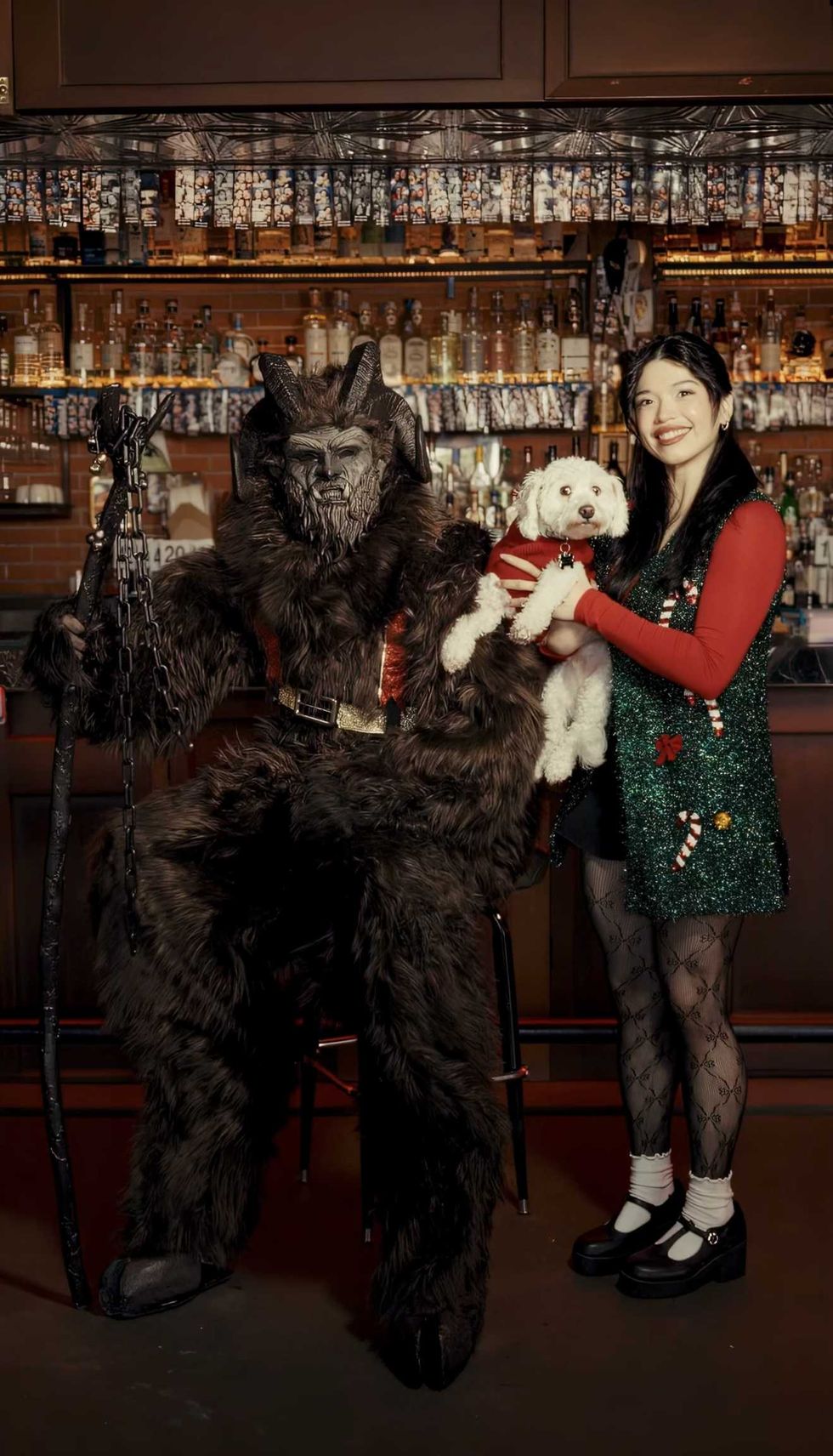Man, Mariah season really is in full swing!
Everywhere you turn, holiday events are taking place: photos with Krampus at Betelgeuse Betelgeuse, Christmas Village at Bayou Bend, a holiday tree-lighting concert at Hermann Square, even a boot-scootin’ holiday bash at The Bryan Museum.
Houstonians definitely have plenty of chances to take a pic with Santa this weekend. Then again, some might prefer to take a snap with 2000s ingenue Shannyn Sossamon, who’ll be at River Oaks Theatre on Sunday.
Thursday, December 4
Betelgeuse Betelgeuse and Hellhound Social Club present “Photos With Krampus"
Montrose cocktail bar/gourmet pizza joint Betelgeuse Betelgeuse is partnering with local dog rescue Hellhound Social Club for “Photos With Krampus,” a spooky and fun take on the traditional holiday event. The event celebrates the mythical horned figure who, in the Central and Eastern Alpine folkloric tradition, is said to accompany Saint Nick on late-night visits to children. A $30 ticket includes one professional photo with Krampus and one cocktail from the bar. 6 pm.
Serrano Gallery presents Fernando Andriacci: "Algarabias" opening reception
Fernando Andriacci, originally from Cuicatlan, Oaxaca, has devoted his life to art in many forms, including painting, ceramics, and monumental murals. He founded the Taller de Artes Plásticas Municipales y Pintura Monumental Rodolfo Nieto, a space that helped shape his artistic path. His art is full of animals, plants, and decorative symbols that create his own fantastic world, a personal bestiary full of imagination and color. Using a mix of techniques, he combines rich textures with balance and harmony. Through Thursday, January 15. 6 pm.
A.D. Players presents Narnia The Musical
The Chronicles of Narnia, C.S, Lewis’s beloved portal-fantasy saga, comes to life in a magical musical where talking animals and mythical beings await. Aslan, the great lion, returns in Narnia’s time of need, guiding children from our world through a journey of courage, selflessness, and wonder - set to soaring, spirited songs. Through Tuesday, December 23. 7:30 pm (2 and 7:30 pm Saturday; 2 pm Sunday).
Friday, December 5
The Kid presents Kids’ Meals Houston Donation Party
Heights neighborhood bar The Kid is hosting a community event supporting Kids’ Meals Houston. Customers can enjoy specialty cocktails – The Comeback Kid and Kids’ Table (a mocktail) – crafted exclusively to raise funds for families facing food insecurity this holiday season. The bar will donate 100 percent of the proceeds from each featured cocktail to help provide nutritious meals to children across Houston. Following the event, cocktails will remain on the menu, and $3 will be donated back to Kids’ Meals Houston. Children are welcome until 7 pm. 4 pm.
Memorial Park Conservancy presents Deck the Park
Get into the holiday spirit at Memorial Park Conservancy’s annual Deck the Park, marking the kickoff of the Park’s month-long Holiday Lights display. Deck the Park will feature a variety of family-friendly activities, including letters to Santa and ornament decorating, a tree lighting ceremony, and an outdoor screening of the holiday classic The Santa Clause, with popcorn and s’mores. Attendees can enjoy seasonal refreshments, including hot cocoa, apple cider, craft beer from Eureka Heights and more. 5 pm.
The Museum of Fine Arts, Houston presents Christmas Village at Bayou Bend
A winter wonderland returns to Bayou Bend with Christmas Village at Bayou Bend. Ima Hogg’s historic mansion is transformed into an immersive, holiday-themed theater experience with live actors, theatrical effects, and Christmas decorations. The Christmas Village also includes carolers singing nightly, a hand-crafted model train, animated projections, and festive activities, including a cotton snowball toss, reindeer games, and sledding on a faux-snow slope. Through Tuesday, December 30. 5:30 pm.
Malbon Store Grand Opening
SoCal culture/golf enthusiasts Stephen and Erica Malbon will be in the Heights this weekend. They’ll be around for the grand opening of their latest Malbom golf apparel store, located on 713 Heights Blvd. (Formerly a Lululemon.) And you know else will be there? Why, it’s none other than Houston rap legend/golf enthusiast Scarface. Here’s hoping Mr. Scarface will drop some rap classics – and, maybe, a few primo golfing tips. 6 pm.
Saturday, December 6
Recipe for Success Foundation presents First Saturday Holiday Market
Recipe for Success is hosting their First Saturday Holiday Market, a full day of family-friendly activities that celebrate the season and spotlight local makers, wellness, and hands-on learning. Attendees can start the morning with yoga, dig into interactive gardening workshops (pre-registration required), join chef-led cooking classes in the kitchen (pre-registration again), enjoy all-day kids’ activities, shop local vendors, taste seasonal bites, and celebrate the holidays outdoors. 9 am.
Community Artists’ Collective presents Ashe Holiday Market
Ashé Holiday Market returns to the Community Artists’ Collective this month. Open Thursdays through Sundays, the market, celebrating its 18th year, features a curated selection of unique items made by local artisans. Additional items include African fabric, masks, and other art pieces from various African nations. Items from the Sankofa Emancipation Project, Third Ward Blooms, and Kindred Stories are also available. Through Saturday, December 27. Noon.
Mid Main Houston presents Holiday on Main
Join Mid Main Houston for Holiday on Main, which proudly supports the Houston Food Bank. Enjoy an afternoon filled with music, Tarot readings, holiday card crafting, and complimentary beverages from Saint Arnold Brewing. Come make the season unforgettable with festive holiday portraits — whether with a loved ones, a special someone, or even a pet. Keep an eye out for special guests, including a special appearance by Santa. 1 pm.
Deck the Hall: The Mayor’s Holiday Tree Lighting Concert
Houston’s beloved and official kickoff to the holiday season is finally here. The free, family-friendly celebration, going down in Hermann Square at City Hall, will feature live music, festive entertainment, and the lighting of Houston’s official holiday tree. Grammy-nominated R&B star Brian McKnight will headline the evening, performing a selection of holiday favorites and timeless hits. And Mayor Whitmire will lead the official countdown to light Houston’s towering holiday tree. 4 pm.
Sunday, December 7
The Bryan Museum presents Holiday Delights: A Boot-Scootin’ Bash
Kick up your boots for a Texas-sized celebration at Holiday Delights at Galveston’s Bryan Museum. This free community event features festive decorations, line dancing, a petting zoo, games, crafts, and photos with Santa. This year, Holiday Delights will shine brighter than ever with a “We Are Texas” 10th anniversary theme, including storybook readings, elf hunts, live music, and free admission to the museum. 10 am.
Color Factory presents Winter Colorland Night
Color Factory is throwing a Winter Colorland party to give everyone a chance to add some tinsel to the season. Attendees are invited to don their seasonal best, belt out their favorite holiday tunes, and enjoy a night of colorful connection. They will also receive a free photo print of their favorite moment, along with an exclusive holiday postcard pack to share the joy of color to those near and far. 4 pm.
Brandy & Monica: The Boy Is Mine Tour
Clinton-era soul sirens Brandy and Monica come to Houston as part of The Boy Is Mine Tour, their first-ever co-headlining journey. The tour builds on the legacy of their 1998 duet “The Boy Is Mine,” which spent 13 consecutive weeks at No. 1 on the Billboard Hot 100 and became a defining cultural touchstone of late ‘90s R&B. They'll be joined by special guests Muni Long, Jamal Roberts (fresh off his American Idol Season 23 win), and Houston’s very own Kelly Rowland. 7 pm.
Photo courtesy of Brandy & Monica





